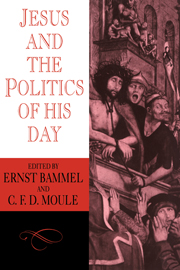Book contents
- Frontmatter
- Contents
- Abbreviations
- Foreword
- The Zealots and Jesus
- The revolution theory from Reimarus to Brandon
- The date and character of Mark
- Some observations on Tendenzkritik
- Argumentum e silentio
- The Poor and the Zealots
- The opposition between Jesus and Judaism
- Judaeo-Christianity and the Jewish establishment, A.D. 33–66
- A.D. 70 in Christian reflection
- The trial of Jesus in the Acta Pilati
- Christ as brigand in ancient anti-Christian polemic
- Jesus as a political agent in a version of the Josippon
- The Feeding of the Multitude
- The coin of ‘Render unto Caesar …’ (A note on some aspects of Mark 12: 13–17; Matt. 22: 15–22; Luke 20:20–26)
- Render to Caesar
- The Temple tax
- ‘Not peace but a sword’: Matt. 10:34ff; Luke 12: 51ff
- The decision of the Supreme Court to put Jesus to death (John 11:47–57) in its context: tradition and redaction in the Gospel of John
- The ‘triumphal’ entry
- The two swords (Luke 22: 35–38)
- The titulus
- Romans 13
- Biblical criticism criticised: with reference to the Markan report of Jesus's examination before the Sanhedrin
- The political charge against Jesus (Luke 23: 2)
- The trial before Pilate
- ‘His witness is true’: A test of the Johannine claim
- Index of Authors
- Index of References
Christ as brigand in ancient anti-Christian polemic
Published online by Cambridge University Press: 19 January 2010
- Frontmatter
- Contents
- Abbreviations
- Foreword
- The Zealots and Jesus
- The revolution theory from Reimarus to Brandon
- The date and character of Mark
- Some observations on Tendenzkritik
- Argumentum e silentio
- The Poor and the Zealots
- The opposition between Jesus and Judaism
- Judaeo-Christianity and the Jewish establishment, A.D. 33–66
- A.D. 70 in Christian reflection
- The trial of Jesus in the Acta Pilati
- Christ as brigand in ancient anti-Christian polemic
- Jesus as a political agent in a version of the Josippon
- The Feeding of the Multitude
- The coin of ‘Render unto Caesar …’ (A note on some aspects of Mark 12: 13–17; Matt. 22: 15–22; Luke 20:20–26)
- Render to Caesar
- The Temple tax
- ‘Not peace but a sword’: Matt. 10:34ff; Luke 12: 51ff
- The decision of the Supreme Court to put Jesus to death (John 11:47–57) in its context: tradition and redaction in the Gospel of John
- The ‘triumphal’ entry
- The two swords (Luke 22: 35–38)
- The titulus
- Romans 13
- Biblical criticism criticised: with reference to the Markan report of Jesus's examination before the Sanhedrin
- The political charge against Jesus (Luke 23: 2)
- The trial before Pilate
- ‘His witness is true’: A test of the Johannine claim
- Index of Authors
- Index of References
Summary
The ancient world described Christ in language also readily associated with criticism of government. Christian apologists used words such as ‘prophet’, ‘teacher’ or ‘wonder-worker’ to present Christ as a divinely-authenticated philosophical guide. Domitian's expulsion of philosophers and astrologers from Rome is simply one instance of a general recognition that such teachers might be significant politically. Their followers' terms of praise had well-worn pejorative counterparts suggesting deception and subversion. The very words which offered the apologists common ground with paganism could therefore facilitate their opponents' depreciation of Christ's teaching. Justin's teacher and doer of mighty works, Tertullian's illuminator and guide of humanity, is Lucian's crucified sophist and Celsus's charlatan and leader of sedition.
This polemic claims attention here in so far as it links Jesus with Jewish nationalism or, in its own terms, with the sedition considered characteristic of Jewry. Robert Eisler took early antichristiana of this kind to confirm his own derivation of Christianity from a messianic independence movement. This chapter is devoted to one such pagan criticism singled out by Eisler. Cited in Lactantius, DI v. 3, 4, it attaches to Christ's ministry the heavily-loaded term of brigandage. Some remarks on the historical context of this charge (I) may serve to introduce an examination of the text (II), followed by an estimate of its significance (III).
Assertions about Christ such as this occur in polemic which is anti-Christian, concerned primarily not with history but with the contemporary church.
- Type
- Chapter
- Information
- Jesus and the Politics of his Day , pp. 183 - 196Publisher: Cambridge University PressPrint publication year: 1984
- 5
- Cited by



